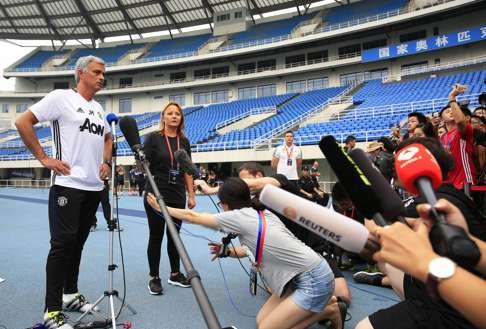
It never rains but it pours: Manchester derby cancelled, but more games expected as Chinese ambitions grow
Torrential rain scuppers first meeting between the rivals on foreign soil in the history of the 135-year-old rivalry, but the fact that the fixture was even scheduled is sign of things to come on mainland
It’s fitting that torrential rain in Beijing put paid to Manchester United against Manchester City at the National Stadium on Monday evening.
As unaccustomed as the clubs are to meeting in China – it was to be the first derby in the history of the 135-year-old rivalry to be played on foreign soil – they will at least have been comfortable with the weather.
If that wasn’t odd enough, one of them was diverted to nearby Tianjin because the plane was unable to land in Beijing. That meant half the players were late to the team hotel, but that wasn’t even the worst of United’s China tour.
Mourinho had to brief reporters at the side of the pitch in Beijing because the press conference room was 40 degrees Celsius and overcrowded with members of the media, many of whom were wearing United. Welcome to China.

Manchester City boss Pep Guardiola, who braved the press conference room earlier in the day, hasn’t had quite the same unforgettable China experience, but both managers were in one voice when it came to the pitch, which has suffered because of the downpours, and their concerns for the safety of their stars.
Beijing’s Manchester derby axed as heavy rainfall makes ‘Bird’s Nest’ pitch unplayable
The things you’ll put up with for money. Make no mistake, that is the reason why the clubs were set to meet 8,000 kilometres from home.
Last month Eric Gao, chief executive of China-based iRENA which has links to both the Chinese Super League, the International Champions Cup (ICC) and various other international sports organisations entering the China market, said Super League clubs were in the market for City players. But it might be more than footballers that are in the shop window.

United have denied they are here to look for Chinese investment, while City became part-owned by China Media Capital in December. Both have inked various other commercial deals in China already and it would not be a surprise if more were to follow.
Meanwhile, reports have suggested the meeting of the Mancunians is in fact for the owners of the ICC, Relevant Sports, to use the showpiece to sell a sizeable stake of their venture to Chinese investors.
Lost in China ☹ and I still figure out what she's calling this place where we stuck #mood Beijing here we go! pic.twitter.com/dKu6tnfnoC— Memphis (@Memphis) July 23, 2016
The ICC only started in 2013, but it has attracted the biggest clubs and, since it expanded to include games in China last summer, brought them to compete in the world’s biggest football market.
Pep Guardiola worried over state of Bird’s Nest pitch as he prepares to rekindle rivalry with Mourinho in China
Investment with a mainland partner – the ICC uses its owner's own Hong Kong arm – would mean more clubs and more games in future summers.
The ambitions of the ICC are clear and the derby was just one aspect of that. The organisation has also been a part of discussions this year between English Premier League clubs regarding a potential breakaway European Super League to replace the Uefa Champions League format.

Another potential rival to the Champions League has since emerged, according to a recent report.
Dalian Wanda, the Chinese group that part-owns Atletico Madrid, is said to be in talks with the French and Italian leagues about its own breakaway competition with the intention of involving the German, Spanish and English top flights in discussions.
The report also suggested the Chinese conglomerate was willing to involve Uefa in their venture, which has since been played by Wanda which stated that the impression that it was “pushing for European leagues and clubs to join a new competition” was inaccurate.

Wanda has since launched another tournament, though. The China Cup International Football Tournament will take place from next year and pit the Chinese national team against three other countries, with the first incarnation to include teams who play like their Asian rivals as they make a tilt for qualifying for the 2018 World Cup in Russia.
With the China Cup, which is set to expand to eight teams, and the ICC’s inevitable expansion in the coming years (whether there is additional Chinese investment or otherwise) it’s clear that Chinese fans can get used to seeing world-class players and the biggest clubs.
This might not be the last time the Manchester clubs travel to China, and given the current trend for investment, both clubs may be Chinese-owned next time out. They will just hope for better weather.

